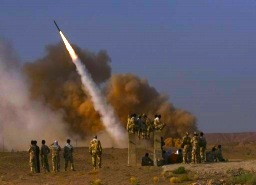Iran's Missiles Go Underground
Featured Image
Today's top nuclear policy stories, with excerpts in bullet form.
Stories we're following today: Wednesday, June 29, 2011.
Iran Unveils Missile Silos as It Begins War Games - William J. Broad in The New York Times [link]
- Iran unveiled underground silos on Monday that would make its missiles less vulnerable to attack, marking the country’s latest show of force in the long standoff with the West over its nuclear program.
- Subterranean silos are considered harder to destroy than surface installations, and Iran hailed them as a defensive asset meant to thwart attackers. State TV quoted [Col. Asghar Qelichkhani] as saying that the missiles were permanently in the vertical position and “ready to hit the predetermined targets.”
- Israel, which views Iran’s nuclear program as an existential threat, has accused Tehran of receiving assistance from North Korea in building underground missile sites. But Colonel Qelichkhani, the spokesman for the war games, said the silos were based on Iranian technology.
Romney Calls New START Proof of Obama’s Inexperience, Proves his own Instead - Kingston Reif and Trish Morris in Nukes of Hazard [link]
- Last summer, Mitt Romney unintentionally proved in a Washington Post Op-Ed attacking the New START treaty that his national security GPS is less effective than a broken compass. His argument was promptly devastated by critics wielding facts.
- [Undeterred, he still wrote about this] in a June 15 post on his blog titled “The Price of Inexperience.”
- ... if Mitt Romney were President instead of Barack Obama, there would be no verifiable limits on the size of Russia’s still enormous nuclear arsenal and no credible plan for dealing with the Iranian ballistic missile threat. Talk about the price of inexperience.
Arab Spring, Persian Winter - Dalia Dassa Kaye and Frederic Wehrey in Foreign Affairs [link]
- ... the political upheaval in the Arab world has led to at least three fundamental shifts in the regional order that have only sharpened the preexisting limitations of Iranian influence.
- ... in a new political order shaped by calls for popular governance, the Iranian brand is losing its luster ... the "resistance bloc" that Iran leads is far less coordinated and omnipotent ... Iran's ability to reap benefits from the Arab uprisings is further limited by its own tumultuous domestic politics.
- Perhaps the contest for predominance in a post-Arab Spring Middle East concerns whether the United States could end up losing more than Iran wins, and thus, Washington needs to be careful not to create opportunities for Iranian mischief.
- As in the Cold War, a policy of containment must include more than just actions taken against one's adversary: it also must create an alternative model and make it viable. If the United States truly wants to counter the influence of Iran and other rejectionist forces in the Arab world, it would be far better served by supporting forces of moderation and more accountable governments in the region.
North Korea, Russia abandon plans for Kim meeting - Denis Dyomkin in Reuters [link]
- The leaders of North Korea and Russia appeared Wednesday to have canceled plans for a summit in the Far East when the Kremlin said President Dmitry Medvedev had no meetings scheduled with Kim Jong-il … "No such meeting is included in the program for Dmitry Medvedev's trip to Vladivostok," Kremlin spokeswoman Natalya Timakova said.
- Kim has made no public visit to Russia since 2002, when he met with then-President Vladimir Putin in Vladivostok. The North Korean leader has made several trips to China, Pyongyang's closest big power ally, in recent years.
Nuclear materials security: Cooperation is key - The Fissile Materials Working Group in the Bulletin of the Atomic Scientists [link]
- As South Korea prepares for the second Nuclear Security Summit, scheduled to take place in Seoul next March, the momentum for collective international action on nuclear terrorism must be sustained.
- The April 2010 Nuclear Security Summit in Washington, DC, created a tremendous opportunity to reshape global perspectives on nuclear terrorism. For the first time, the idea of fighting nuclear terrorism emerged on the collective international agenda, rather than on the discrete agendas of individual nations.
- At least two more … meetings are planned to take place before the 2012 Seoul summit … [which] need to work to clarify the international collaborative element and to reinforce the goal of securing vulnerable nuclear materials. The meetings should focus on nuclear security in the wake of Fukushima. The synergy of safety and security must be included in the 2012 agenda.
Iran: The Next Generation - Reza Marashi and Jason Rezaian in The National Interest [link]
- The recent back-and-forth between Ahmadinejad and Khamenei reflects a deeper generational shift. After three decades of Iran’s clerical network dominating the political scene, the emergence of the Islamic Republic’s next generation of leaders—nonclerical, war-veteran technocrats—may well portend larger ramifications for Iran’s inward and outward orientation.
- With the new generation of Iranian political elite increasingly assuming positions of power, the Islamic Republic may enter a new phase in its history that allows for notable changes in domestic and foreign policies—perhaps short of the regime change that some outside Iran prefer, but far from negligible to the millions of Iranians living inside the country who know they deserve better than the status quo.



